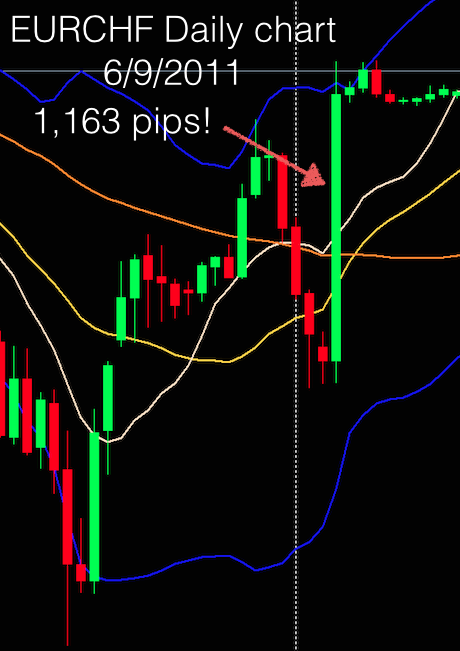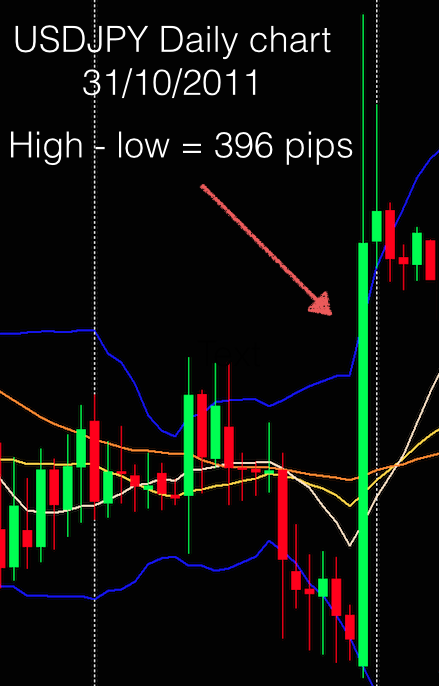“Stick to your trading plan” is what we hear said all the time and I’ve been known to say it too. Although that may be the best thing to do, if your trading plan is ok, there’s the odd time that crops up that makes you question it.
Being a dedicated forex trader I’ve done some serious screen time. Eyes locked furiously on the charts waiting for my setups, mesmerized by the ebb and flow of the markets.
While going about my normal trading day, there have been several instances where the radical has occurred, right in front of my eyes. If you’re a forex trader, one day this will happen to you, if it hasn’t already. It’ll be a different event, but the effect will be the same, an event that causes a massive change in valuation in an instant.
Let’s take a look at a few examples:
In 2011 when the Swiss pegged the CHF to the EUR, it was swift and sudden. If you weren’t there at the right time, you’d have missed it, but what a ride!

When the Japanese entered the market to control their currency valuation, it happened without warning as to the exact timing and was a freight train of wreckage on the chart. It totally reversed the trend we loved being on, so all open trending system trades turned foul.

These are examples where currency valuations become radically different all of a sudden. The ferocity of the move is incredibly forceful and it’s one-way traffic as to which direction the price is going.
Herein lies the gift – “one-way traffic.” When we work out our trading plan, the systems we’re using are sometimes right and sometimes wrong. We use conservative risk management to allow us to trade through the drawdown onto profitability and beyond. When we have a sudden one-directional move like these, do we just sit on the sidelines and watch it happen, because it wasn’t part of our trading plan?
Reasons why it’s so easy to sit there and just watch:
• You’re disciplined and it’s not part of your trading plan to make an entry.
• You freeze and don’t know how to react because this hasn’t happened to you before.
• You don’t know when the move is going to stop, so you’re fearful of it going badly against you just as fast, if you get in.
• You don’t know how much to buy or sell in this kind of market.
• You don’t know why it’s happening, as it’s happening so fast you can’t access the news fast enough to find out what’s creating the move.
• You can’t take your eyes off the screen because the price is going so fast it’s captivating.
Reasons why you might jump in for the ride and take a trade:
• You’re a trader and here to make money.
• This is an exceptional opportunity where the direction the price is going is more certain than usual.
• You’ve rehearsed these sorts of events and are ready to profit from them.
• You know how much to buy or sell and how much risk you’re prepared to take.
• Abnormal profits can be achieved when these events occur and you’re ready to be part of it.
• You have ready access to a news stream and know what’s causing the move, so you’re confident to react.
The reasons why you’d watch the opportunity pass you by are normal reactions and partially the product of fear and the unfamiliar.
To move to a state of immediate action, it takes planning and rehearsal. When the market is fearful and in panic mode, the way to make money from it is to act in accordance with a planned response.
Ask these questions:
• Will I check a newsfeed for reasons for the move, and if so, how will I access this quickly?
• How much will I risk?
• What’s my position size?
• Will I place a stop loss in the market?
• Will I add to my position as it gains profit?
• How will I decide when to get out?
In New Zealand we’ve been brought up with earthquake drills, to prepare our automatic response in the face of disaster. When we’re surrounded by panic, our natural reactions are not necessarily the best for us. We need to train ourselves. The same is true for our response in a panicked financial market.
It’s time to move from rigid discipline to our normal market trading plans; to making sure you’re ready and rehearsed with your panicked markets plan. Will you be ready to reap the abnormal profits, as periods of low volatility will not last?
Have you seen panic in action in the financial markets? If so, what was the cause and did you dare to enter for profit? Post a comment below.
= = =




